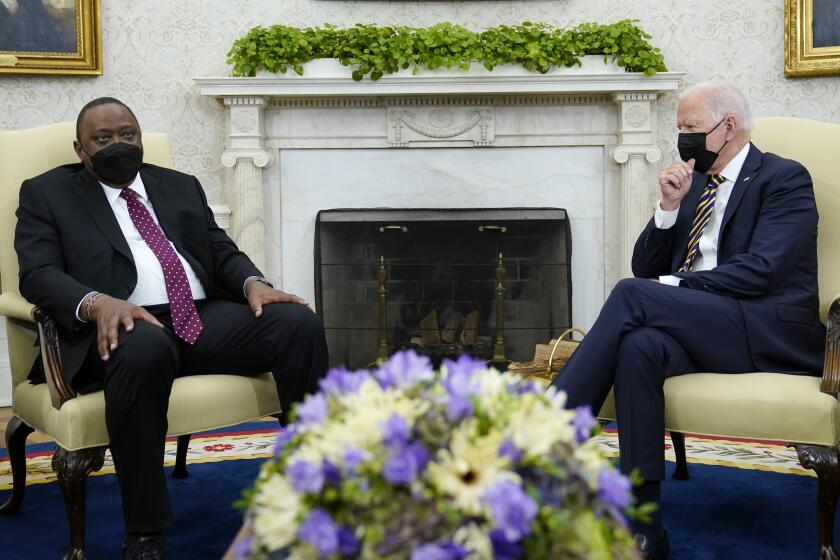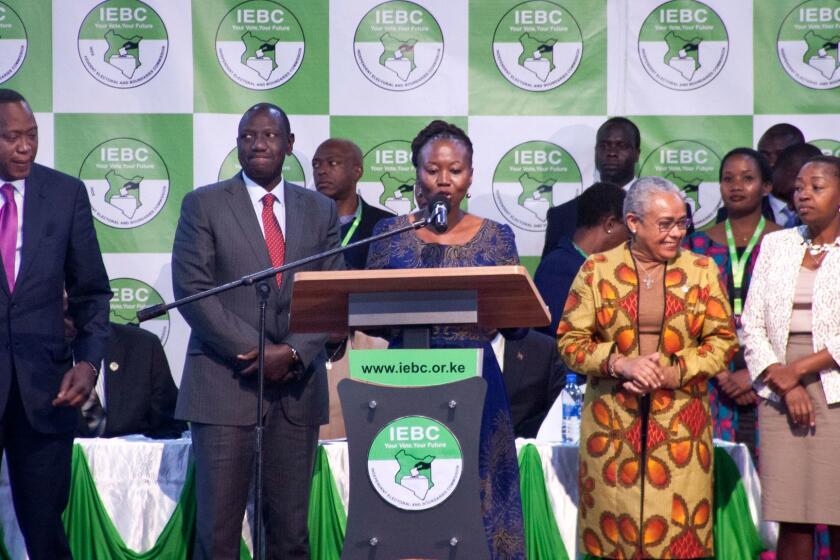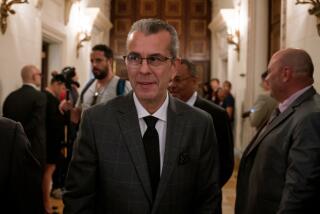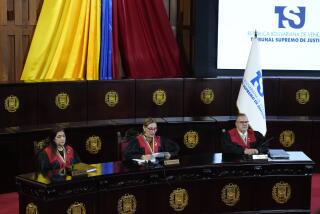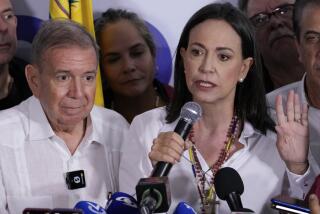Kenyan opposition candidate says he’ll challenge close presidential election loss
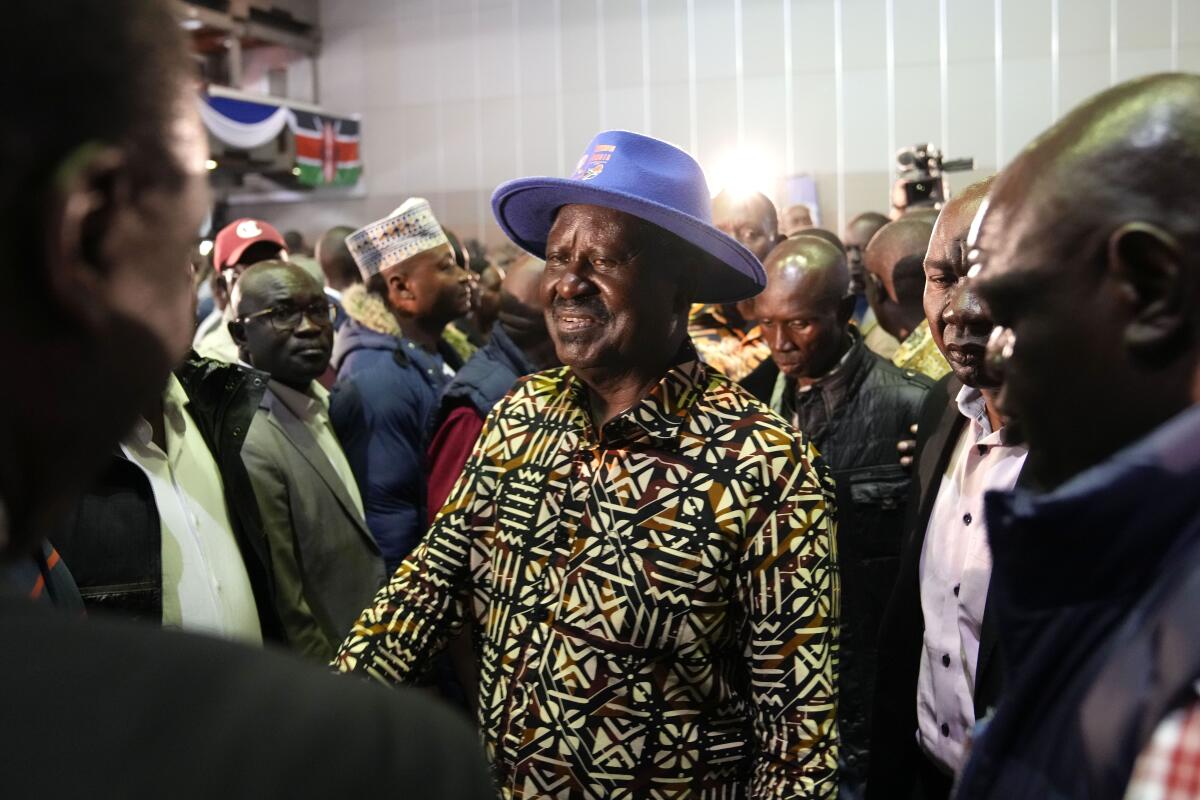
- Share via
NAIROBI — Kenyan opposition figure Raila Odinga said Tuesday that he would use “all legal options” to challenge the results of his close presidential race against declared winner Deputy President William Ruto, bringing new uncertainty to a country where the vote was widely considered to be its most peaceful.
East Africa’s most stable democracy now faces weeks of disputes and the possibility that the Supreme Court will order a fresh election. Already, religious and other leaders have pleaded for calm in a country with a history of deadly postelection violence.
“Let no one take the law into their own hands,” Odinga told his supporters.
It was his first appearance since Kenya’s electoral commission chairman on Monday declared Ruto the winner with almost 50.5% of the vote. Four of the seven commissioners abruptly announced they couldn’t support the results and resigned, and Odinga supporters scuffled with the remaining commissioners at the declaration venue.
Shortly before Odinga spoke, the four commissioners who resigned told journalists that the chairman’s math added up to 100.01% and that the excess votes would have made a “significant difference.” They also said he didn’t give them a chance to discuss the results before his declaration.
“What we saw yesterday was a travesty and blatant disregard of the constitution,” Odinga said, calling the election results “null and void.”
President Biden and Kenyan President Uhuru Kenyatta discuss financial transparency as the East African leader visits the White House.
The 77-year-old has pursued the presidency for a quarter-century. His campaign has seven days after Monday’s declaration to file a petition with the Supreme Court, which would then have 14 days to make a ruling.
Odinga is renowned as a fighter, who was detained in the 1980s over his push for multiparty democracy, and as a supporter of Kenya’s groundbreaking 2010 constitution. His claim that the deeply troubled 2007 election was stolen from him led to violence that left more than 1,000 dead. Though he boycotted the fresh 2017 vote, his court challenge led to election reforms.
The electoral commission had been widely seen as improving its transparency in this election, practically inviting Kenyans to do the tallying themselves by posting online the more than 46,000 results forms from around the country.
The local Elections Observation Group announced Tuesday that its highly regarded parallel voting tally “corroborates the official
results,” in an important check on the process.
A repeat presidential election in Kenya due next week was plunged into crisis Wednesday when senior electoral officials spoke out against threats and interference from politicians, and a senior electoral commissioner fled to the U.S. citing death threats.
But Odinga asserted that only the electoral commission chairman could see the final results before the declaration. “The law does not vest in the chair the powers of a dictator,” he said, and insisted that decisions by the commission be taken by consensus.
There was no immediate statement from the electoral commission or its chairman. A screen at its tallying center that had been showing cumulative election results stopped being updated Saturday and was later turned off. The official form showing final results could not be accessed on the commission’s website Tuesday.
Odinga’s campaign had expected victory after outgoing President Uhuru Kenyatta backed Odinga, his former rival.
The 55-year-old Ruto appealed to Kenyans by campaigning on economic differences and not ethnic ones. He portrayed himself as an outsider of humble origin defying the political dynasties of Kenyatta and Odinga, whose fathers were Kenya’s first president and vice president, respectively.
Start your day right
Sign up for Essential California for the L.A. Times biggest news, features and recommendations in your inbox six days a week.
You may occasionally receive promotional content from the Los Angeles Times.
Still, the turnout in last Tuesday’s vote dipped to 65% as Kenyans across the country of 56 million people expressed frustration and lack of confidence that the candidates would address the problems of rising prices, high unemployment and widespread corruption. The now-wealthy Ruto has faced and denied multiple allegations of land grabs and other graft.
Ruto’s past also includes an indictment by the International Criminal Court for crimes against humanity over his role in the 2007 election violence, though the case was dropped amid allegations of witness intimidation.
As a growing number of African leaders issued statements congratulating Ruto, Kenya’s outgoing president remained silent.
More to Read
Sign up for Essential California
The most important California stories and recommendations in your inbox every morning.
You may occasionally receive promotional content from the Los Angeles Times.
